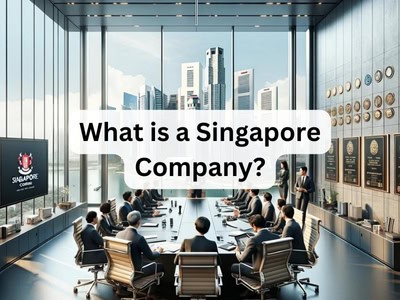Singapore Company Registration Guide – ACRA Process, Requirements & Compliance
 Definition of a Singapore company
Definition of a Singapore company
According to the definition by Accounting and Corporate Regulatory Authority of Singapore (“ACRA”), a Singapore company is a business entity that has been registered under the Companies Act, Chapter 50. The most common business entity in Singapore is the private limited company, which usually has the words ‘Pte Ltd’, or ‘Ltd’ as part of its business name.
Once registered with the ACRA (Accounting and Corporate Regulatory Authority), a Singapore company becomes a separate legal entity offering limited liability protection. Singapore’s pro-business policies and low tax rates, and ranked it among the best places globally to start a business.
This is one of the major reasons why setting up a company in Singapore is becoming a popular choice for both locals and foreign entrepreneurs.
General Info
- Legal Entity
- It is a legal entity separate and distinct from its shareholders and directors.
- It is a taxable entity in its own right
- Language
- Main language: English
- Secondary language: Chinese, Malay
- Authority
- Accounting and Corporate Regulatory Authority (“ACRA”)
- The statutory board under the Ministry of Finance of Singapore.
- It administers and oversees the regulation of companies and public accountants in Singapore.
- It is vested with the power to ensure compliance and monitor the regulatory environment for businesses, public accountants, and corporate service providers (as stipulated under the Companies’ Act).
- Inland Revenue Authority of Singapore (“IRAS”)
- The statutory board under the Ministry of Finance of Singapore.
- It is the main tax administrator to the government.
- Besides the task of tax collection, IRAS is also tasked with responsibilities in tax treaty negotiations, drafting tax legislations as well as providing advice on property valuation to the Singaporean Government.
- Accounting and Corporate Regulatory Authority (“ACRA”)
Registering a company in Singapore offers limited liability protection and is the most common choice for entrepreneurs setting up a company in Singapore.
What are the key legal requirements for directors, shareholders, and company setups in Singapore?
Members
- Directors
- According to the Companies Act, every company must have at least one director who is ordinarily resident in Singapore.
- Definition of “ordinarily resident in Singapore”: it means the director’s usual place of residence is in Singapore.
- The director could be either a Singapore Citizen, or a Singapore Permanent Resident or an EntrePass holder.
- Minimum age limit: 18 years
- Maximum age limit: none
- Cannot be someone declared bankrupt or convicted a criminal offence before.
- An Employment Pass holder (who is ordinarily resident) may be eligible to act as a director in this capacity. For EP holders who want to take up a secondary directorship position in another company (other than the company their EP is approved for), will have to apply for and be granted a Letter of Consent (“LOC”) before the registration of the directorship positions with ACRA.
- According to the Companies Act, every company must have at least one director who is ordinarily resident in Singapore.
- Shareholders
- All companies must have a minimum of one shareholder who can be a local or foreign person.
- Shareholders could either be appointed or not be appointed as a Director of the Company.
- Company Secretary
- Every company is mandated to appoint a secretary within 6 months from the day of its incorporation.
- The company secretary must be reside locally in Singapore
- The company secretary cannot be the sole director of the company.
- The company secretary of a public company must comply with section 171(1AA) of the Companies Act, which requires that he or she must possess a minimum of one of the following qualifications:
- Has been the company secretary of a company for at least 3 of the 5 years immediately before his appointment as the company secretary of the public company, and/or
- Is a qualified person under the Legal Profession Act (Cap. 161) , and/or
- Is a public accountant registered under the Accountants Act (Cap. 2) , and/or
- Is a member of the Institute of Certified Public Accountants of Singapore , and/or
- Is a member of the Singapore Association of the Institute of Chartered Secretaries and Administrators, and/or
- Is a member of the Association of International Accountants (Singapore Branch) , and/or
- Is a member of the Institute of Company Accountants, Singapore.
- Auditor
- All locally incorporated companies are mandated to appoint an auditor within three months of its incorporation
- The company is exempted from such requirement if it is exempted from audit requirements (companies with less than 20 individual shareholders with no corporate shareholders and the annual turnovers that are less than S $5 million are exempt from audit requirements).
Company Name
-
- ACRA’s Company Name Guidelines
ACRA has published to the Practice Direction No.4 of 2020 that spelt out the following:- The rules in the selection of proposed company names;
- The facilities available to support in the name selection process; and
- The guidelines for the selection of proposed company names.
- Unacceptable company names
In Singapore, Section 27(1) of the Companies Act (2006) governs the selection of a company name. Section 27 stipulates that the Registrar (unless the Minister approves it) will reject the company name registration if it is:- Undesirable due to obscene words or if it includes religious names
- Identical to any registered company or business name
- Identical to any reserved name as per:
- The Business Registration Act 2014,
- Limited Liability Partnership Act, or
- Limited Partnership Act
- Refused for registration by the Registrar as per the Minister’s directions.
- ACRA’s Company Name Guidelines
Registered Office Address
In Singapore, you need to have a local, physical Singapore address as the registered office address of the company. While the registered office address can be either a residential or commercial address, a P.O. Box cannot be used as the registered office address.
Company Shares and Shareholders
In Singapore, the company law mandates all companies to maintain share capital throughout the company’s life. Companies must have at least S$1 in paid-up capital for company incorporation.
- Share Capital Requirement
- Share capital means the money that has been invested in the company (by shareholders) in exchange for company shares that were issued to shareholders.
- In Singapore, the total share capital of a company can be categorised into two groups: paid-up capital and unpaid capital.
- Paid-up capital: the money that have been paid by shareholders in full for the issued shares.
- Unpaid share capital: it is the situation when none of the monies due for an allotment of shares (that have been issued) has been paid. In certain small companies, the unpaid share capital is often to the company indefinitely.
- Share capital means the money that has been invested in the company (by shareholders) in exchange for company shares that were issued to shareholders.
- Types of Shares
- Ordinary shares
All companies have to issue one ordinary share in order to incorporate the company. Generally, ordinary shares come with voting rights of one vote per share at general meetings, the equal right to dividends, and the right to share the surplus of capital when the company is wound up. - Non-voting shares
As the name suggests, non-voting shares do not provide the shareholder either the right to attend general meetings or the right. Generally, non-voting shares are issued to the main shareholder’s family members or employees. - Preference shares
This type of share gives ordinary shareholders the special rights dividend payments and in most cases, it is non-voting shares. A company may decide to issue dividends to preference shareholders before its ordinary shareholders. Preference shares may have rights to share the surplus of capital or claim the company assets over ordinary shareholders. - Alphabet shares
A company can choose to have different classes of shares (commonly Class A, Class B, Class C and so forth) with each providing different privileges and rights to shareholders. - Management shares
Management shares confer extra voting rights and it is offered to the founders of the business. - Redeemable shares
A redeemable share, as the name implies, is issued with a term that the company will buy back the share at a future date. - Deferred shares
No dividend will be paid to deferred shares until other shareholders have received a minimum dividend.
- Ordinary shares
- Who Can Be A Shareholder?
- A private limited company is mandated to have at least one shareholder and the maximum number of shareholders is capped at 50.
- Shareholders can be either natural persons or corporations and can be either local or foreign.
- 100% company ownership by foreign shareholders is allowed in Singapore.
- To be eligible to be a shareholder, an individual must first purchase company shares.
- The shareholder does not hold any company assets nor is not liable for the company debts as the company is a separate legal entity.
Singapore company registration allows flexible ownership transfers, making it easier to restructure or bring in new shareholders when needed.
Incorporation Form and Fee
- Documents Needed
- Company Name (make sure it is an ACRA-approved company name)Important note: The reservation period of an ACRA-approved company name is 120 days from the date of approval. There will be no further extension of name reservation period allowed.
- Brief description of the business activities
- Details of shareholders, directors and company secretary
- Registered office address
- Constitution (formerly known as Memorandum and Articles of Association)
- Company Name (make sure it is an ACRA-approved company name)Important note: The reservation period of an ACRA-approved company name is 120 days from the date of approval. There will be no further extension of name reservation period allowed.
- Constitution
Constitution contains information:- Company’s name
- Registered office’s location
- Liability of the members
- Company’s capital structure
- Names of the subscribers and the number of shares subscribed by them
- Primary business activities of the company
- The governing rules of the internal management of the company
- Incorporation Process
- In Singapore, all applications for the company registration are all submitted online via BizFile System (ACRA’s electronic filing and information retrieval system).
- Log into BizFile+ using the SingPass or CorpPass to perform online transaction. All proposed director (including shareholder and secretary) will need to endorse their consent online via BizFile+ within 120 days (from the name application approval date).
- For foreigners, the company incorporation process could be completed with the help of a registered filing agent (for example law firm, accounting firm or corporate secretarial firm) to submit an online application on your behalf.
- Registration Fee
- Name Application Fee: $15
- Registration Fee: $300
- After Incorporation Process
- Issuance of Unique Entity Number (“UEN”)Every newly incorporated company will be issued with a system-generated UEN- an identification number that all businesses need to use when dealing/transacting with government agencies.
- Issuance of Business ProfileUpon successful incorporation, all new company will receive a free Business Profile. It is an electronic report with all business registration information of that company. The person who filed the incorporation will receive an email with a URL to download the free Business Profile.
- Issuance of Company’s items
- Share certificates for each of the shareholders
- Statutory Registers
- Common seal
- Rubber Stamp (optional)
- Corporate Bank Accounts After the incorporation, a company can open a corporate account at any of the local banks in Singapore or an overseas bank in Singapore.
- Goods and Services Tax Registration
All Singaporean companies with over S$1-million taxable supplies of goods and services are mandated to register for GST and file GST returns on a quarterly basis.
Compliance Requirements for companies in Singapore
- Fiscal year determination
Every Singapore’s company must determine its financial year end (“FYE”), which is not necessarily to be on 31st of December. - Annual general meeting (“AGM”)
- Every company have to hold its AGM every calendar year, with its financial statements tabled at the AGM for shareholders’ approval.
- For Companies with FYE ending before 31 Aug 2018, AGM has to be held within 18 months from the date of incorporation or 6 months from FYE date, whichever earlier.
- For Companies with FYE ending on or after 31 Aug 2018, the AGM has to be held within 6 months from FYE.
- Annual returns
- It is mandatory for every company to file its annual returns within one month of its AGM date. For Companies with financial year end (“FYE”) ending before 31 Aug 2018, within 30 days from the AGM date.
- Companies must file their annual returns within 7 months after FYE if their FYE ending on or after 31 Aug 2018.
- Tax filing30th November is the deadline for filing of corporate income tax return in Singapore.
- Financial StatementsPreparation of Financial Statements is part of the compliance requirements in Singapore. It has to be done within the six-month window from the date of the AGM.
Know all about Compliance Requirements
Why Set Up a Company in Singapore?
- 100% foreign ownership allowed which means anyone can incorporate a company in Singapore.
- The ACRA Process is very simple with online company registration being possible through BizFile+.
- Low corporate tax rates and strong double taxation treaties is a strong benefit.
- Reputation as a global business hub in Asia.
- Mandatory company name check ensures unique brand identity.
Closing the Business in Singapore
- Striking off
- A company can apply to ACRA to strike off its name from the Register.
- The striking-off application will be approved by ACRA if the company can prove that is not carrying on any business, and the company is able to fulfil the striking-off criteria.
- For a GST-registered company, it has to apply for cancellation of GST registration with IRAS.
- A company can apply to ACRA to strike off its name from the Register.
- Members’ Voluntary Winding Up
- A company may opt to wind up voluntarily if the directors are confident that the company will be able to repay its debts in full within 12 months after the commencement of the winding up.
- A liquidator, or provisional liquidator, will be appointed by the company to wind up its affairs and file the necessary notifications required under the Companies Act.
- Creditors’ Voluntary Winding Up
- “Creditors’ voluntary winding up” is another option if the company’s directors believe that it cannot continue its business.
- A liquidator, or provisional liquidator, will be appointed by the company to wind up its affairs and file the necessary notifications required under the Companies Act.
- Compulsory Winding up
- This situation happens under an Order of the Court (due to reasons like the company is unable to pay its debts)
- The Court may appoint a liquidator to wind up the affairs of the company.
- If there is no liquidator being appointed by the Court, the Official Receiver shall be the liquidator of the company.
- Receivership
This happens when a receiver is appointed to enforce a charge for the benefit of holders of debentures of the company. - Judicial Management
- This is a debt restructuring method where an independent judicial manager is appointed to manage the affairs, business, and company property.
- The company is also temporarily exempted from legal proceedings by third parties.
- Instead of winding up, the company is given the opportunity to rehabilitate.


 Definition of a Singapore company
Definition of a Singapore company



